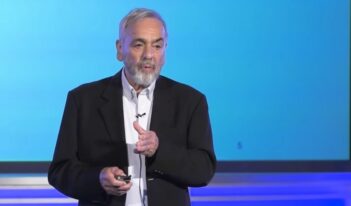
In reflecting on society’s response to COVID-19, Kunreuther argued that it should reinvigorate the field of disaster preparedness.
As a historian of disaster policy, I was an avid reader of Howard Kunreuther’s work long before I met him in person. I will never forget my first encounter with him. I was a new professor at Drexel University, and I dropped by his office at Wharton to introduce myself. Howard gave me his full attention, expressed deep and sincere interest in my work, and presented me with a copy of his 1969 classic, The Economics of Natural Disasters, which I still proudly keep in my office and refer to frequently. We went on to co-author an article “Troubled Waters: The National Flood Insurance Program in Historical Perspective,” an article which appeared in the Journal of Policy History in 2014. Writing with Howard was enjoyable from beginning to end; he was characteristically generous with insights and credit throughout the entire collaboration.
The last time I talked with Howard was on April 14, 2020. He was a guest on my podcast COVIDCalls, a daily discussion I conducted with disaster experts from all fields throughout the first two years of the pandemic. As always, Howard meaningfully drew together disparate historical cases, used good humor to make his points, and insisted on the possibility of research that might influence leadership, all to save lives.
I include below a few key, lightly edited excerpts from this conversation, although you can watch our entire discussion online. I started by asking Howard how he was adjusting to life in lockdown.
Howard: Well, I’m adapting my life in a similar way to how you’re adapting your life. When I look at you, at the screen here, I’m at home. I’m working. I am somehow in touch with a number of people who are concerned with this particular virus. . . . I am at the same time in very close touch with our family. We have four children. My wife Gail and I are here at home and four children are elsewhere. And we are actually in touch with them. We had a zoom Seder on Wednesday night.
I am really focusing on the impact that COVID-19 is having on our future . . . and trying to see whether there’s an opportunity here with COVID-19 to really take advantage of the fact that people are paying attention to these low probability high consequence events, which is a theme, as you know, our Risk Center has been focusing on for 35 years. At the time that we started, there were very few people who were paying attention to this. Our first study, I like to remind people—and you may remember, Scott, although you’re somewhat younger than I am—was why people didn’t wear seatbelts, which was the case a number of years ago and that, I think, has been taken care of. We’re much more interested now in the global risks.
Scott: What kind of information does it take to begin to slow people down and get them to think more critically about disaster risk?
Howard: You know, Scott, this is the critical issue we’re facing right now. We really, really need leadership at the top. Frankly, we need to do something that you and I have talked about over the years and that is linking our science with our policy. We need scientists to be our leaders. We need to have people who are in offices—governors, leaders in Congress, leaders in the Presidency—we need these people to indicate to us that we have a problem that we have to pay attention to . . . and then at the same time provide the right data. The minute we got the data from China, we could actually compile it and we could provide that information to people so they would understand it. And then when you put the regulations in place, and if regulations had been put in place in February, we would have been in a different situation than we are right now.
Scott: So where are you seeing policy interventions right now that you think should be copied, replicated, and that are working in this particular moment?
Howard: All of us as individuals have biases and policymakers clearly have biases—myopia being one of them—in the sense that they are elected officials. They have an election coming up in 2020. Everyone is thinking about what’s going to happen to them in that election. The one acronym that I will use given your question is NIMTOFF; if … asked what it meant, most people say “not in my”—they do get that, but it’s “not in my term of office.” And so if you’re going to have that, you’re going to have a whole set of things that are going to happen, that are actually going to be very dysfunctional from the vantage point of dealing with this particular situation that we’re faced with.
I do think that what has also happened, and this is the positive part of all of this, that we have governors who have actually taken the situation and recognized how serious it. And I think the regulations that have been followed by almost every state now, but reluctantly so by some of the states, are the ones that I think are helping to reduce the number of fatalities. I think the positive part about COVID-19 and coronavirus is the compassion that people have felt, the fact that they are following a set of regulations, the fact that we’re all paying attention to them. And I think that’s true of everyone that I’ve talked to, we’re all saying I don’t really want to go out without a mask. I want to make sure that I do my shopping very infrequently. So there are things that are happening here that are positive.
Scott: Do we need a deeper bench in the bureaucracy? Do we need more risk experts in the government?
Howard: I would say yes, we probably do. What we really find is that people do extremely well when we have a lot of past experience. We have a market that is operating and you learn something from it. People don’t know anything about the 1918 pandemic, until we now are reading about how embarrassed we were as a country to even talk about it. I never had it in my history class. I never knew much about it. I thought it was much more in Europe and other parts of the world but never thought about what it did in the United States. So, we don’t have that feedback. And so, as a result, we absolutely have to change our view of how we deal with the world and hopefully the coronavirus will do the kinds of things you’re suggesting, which is not only to bring risk on the table, but to bring epidemiology, bring the science and experts who can say something, and to try to take some steps to prepare. I mean, that is the big, big challenge that we face in this whole area.
Scott: What do you see happening in the wake of COVID-19 in the private realm of risk management, in the insurance realm?
Howard: With COVID-19 I think the big issue right now with everyone is: What is covered and what is not covered for pandemics? Many of the policies are business interruption coverage, particularly for small firms. And so there is a lot of attention that is being paid right now and our Risk Center is involved in some discussions on what kind of a program can be developed for the future for dealing with pandemics, where the insurance industry recognizes that they don’t have good data on what the likelihood is going to be of another pandemic. The consequences of that could be enormous.
Scott: So many people look up to you as a research mentor Howard. I think there’s going to be a new generation of disaster researchers to come out of this pandemic. Do you have the optimism, that a rising generation of scholars can define these problems, find support to work on these problems, and actually make a difference?
Howard: Absolutely. I am very optimistic about that, Scott, in the way that you’re presenting it. I wouldn’t be involved in this research if it wasn’t something that I felt was so important for us to do. And mainly because there are young people who are taking advantage—who are involved and, frankly, who I’ve been learning from, and I’ve had an opportunity to interact with. Yes, I’m optimistic. It’s one of the most exciting times in my life, because people are actually paying attention to a lot of these issues. I’ve really enjoyed our dialogue and I look forward to future interactions with you.
This essay is part of a series celebrating the life and scholarship of Howard Kunreuther, titled “Commemorating Howard Kunreuther.”




